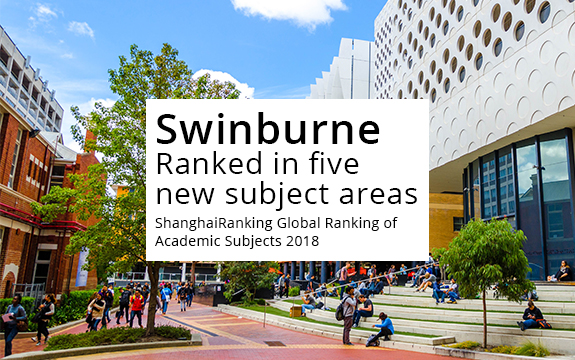Swinburne subjects debut in Global Ranking of Academic Subjects

In Summary
- Five new subjects have been included in the ShanghaiRankings Global Ranking of Academic Subjects
- Overall, nine subjects were included in the rankings
- This result demonstrates the university’s efforts to conduct world-class research with impact
Swinburne has had five new subject areas included in the highly-regarded ShanghaiRanking’s Global Ranking of Academic Subjects 2018.
Of the nine subjects featured overall, the five areas placed for the first time in this prestigious world university research rankings scheme are:
- Psychology: 401-400
- Communication: 201-300
- Management: 401-500
- Business administration: 301-400
- Hospitality and tourism: 101-150
Deputy Vice-Chancellor (Research and Development), Professor Aleksandar Subic, says this excellent result is an outcome of the university’s outstanding efforts to conduct world-class research with impact.
“The inclusion of new subject areas in ShanghaiRanking is a major milestone for these disciplines, which demonstrates our systematic growth in research capacity, excellence and reputation across Swinburne,” Professor Subic says.
“Our research strategy is focused on establishing world-class research concentrations in a range of focus areas across the university, which have capacity for sustained success at an international level.
“This enables us to deliver real impact that transforms industries, improves lives and shapes communities through our deep engagement with industry, business and society.”
Swinburne’s civil engineering subject has improved its position in the rankings since 2017, and is now placed at 133.
Physics, materials science and engineering and computer science have all ranked highly again.
Swinburne research highlights
Swinburne’s world-leading and internationally recognised research is reflected in recent initiatives which include:
- A first-of-its-kind partnership with CSIRO in Silicon Valley to increase Australia-US research, innovation and commercialisation
- The creation of a blockchain technology platform to revolutionise the global art trade industry in partnership with ArtChain Global
- The development of a world-first, self-fitting hearing aid with rechargeable battery and the ability to be set via a smartphone
- The launch of Swinburne’s Innovation Precinct, a central point connecting the university’s research and innovation capabilities and providing a place for staff and students to collaborate with industry
ShanghaiRanking subject rankings methodology
The ShanghaiRanking Global Ranking of Academic Subjects measures research performance, based on indicators including:
- Research productivity
- Research quality
- Extent of international collaboration
- Research published in top journals
- Highest academic recognitions
Professor Subic says the university will continue its commitment to fostering a research-led innovation ecosystem based on interdisciplinary research collaboration.
“We have so much to be proud of at Swinburne, as we continue to see our students and staff translating innovative research outcomes into new technologies, products and services that will generate social and economic impact.”

